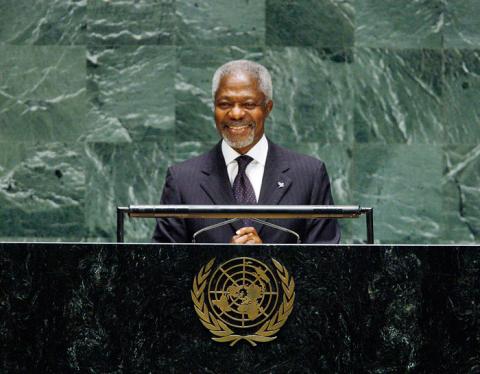Reflections on the UN at 70

By Koffi Annan
Seventy years ago, world leaders gathered in San Francisco to sign a unique and historic document—the Charter of the United Nations. In the name of “We the peoples”, they charted a path to a world where faith in the dignity and worth of the human person would be reaffirmed.
In the seven decades since, the world has been transformed by new technologies, by the forces of globalization, and not least, by the accomplishments of the United Nations itself. Driven by the spirit of international cooperation and multilateral diplomacy that lie at the heart of the Organization, millions have been lifted out of abject poverty, protected from the violence of armed conflict, or sheltered from the devastation of natural disasters.
It has inspired, innovated, and catalysed; the Millennium Development Goals became a revolution in international affairs, placing poverty in all its guises at the top of the international agenda for the first time. The establishment of the Global Fund to Fight AIDS, Tuberculosis and Malaria has helped save the lives of millions and provided a new template for effective international cooperation. The International Criminal Court and the rise of the doctrine of Responsibility to Protect redefined the notion of State sovereignty and offered hope to the victims of the most heinous crimes.
The United Nations, with its rules and institutions are at the heart of the international system. They encourage States to prevent or settle disputes peacefully—one of the reasons that fewer people than ever before die from armed conflict. The United Nations speaks for the voiceless, feeds the hungry, protects the displaced, combats organized crime and terrorism, and fights disease across the globe.
And these are just the headline-grabbing achievements. Seventy years on, the work of the Organization touches every corner of the globe. Of no less importance, for example, is the fact that more multilateral agreements and treaties have been developed at the United Nations in the past six decades than in all of human history, and each addition to this body of international law binds our global community closer together.
Many of these accomplishments are due to the courageous and resourceful staff of the Organization, who dedicate themselves to humanitarian principles and work tirelessly in the most dangerous and desperate places on earth—where they are needed most.
Unfortunately, despite these efforts and achievements, some of the threats the United Nations was mandated to end continue to cast a shadow.
The United Nations celebrates its 70th birthday at a time when global economic inequality is unacceptably high and rising; levels of international migration are unprecedented, deadly pandemics—such as Ebola—can still spread rapidly to threaten entire regions, and violent conflict, of ten driven by unresolved sectarian or religious divides, plagues us still.
Each of these threats has a global dimension that can only be resolved by global action, yet the international architecture of the post-Second World War era—on which the United Nations is founded—is increasingly contested. In a world that evolves as quickly as ours, no institution that remains static can continue to be effective. So we must take this opportunity to reshape the Organization to better meet contemporary challenges. We must rededicate ourselves to the notion of a representative and inclusive United Nations; one with the well-being of each individual, not simply the sovereignty of every State, at its heart. An institution of strong leadership where the Governments and citizens of all nations have an opportunity to come together to forge a common future of peace and prosperity.
Forty years with the United Nations taught me many lessons, but one remains foremost in my mind, that healthy and sustainable societies are based on three pillars: peace and security, sustainable development, the rule of law and respect for human rights. There can be no long-term security without development; there can be no long-term development without security; and no society can long remain prosperous without the rule of law and respect for human rights.
The writer is the former UN Secretary General
This article first appeared in UN Chronicle